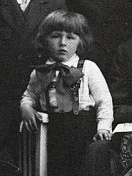I experienced a brutal, unlawful expulsion from my homeland

Stáhnout obrázek
Josef Schicho was born on 29 January 1930 in Kaplice. His parents ran the family farm there. The Schicho family were of German nationality. He grew up with his younger sister Anna Maria. He attended primary school in Kaplice. In 1944 he completed military training in the Alps. In the spring of 1945, he was drafted into the Volkssturm units to defend the area around Nové Hrady. He escaped from there before the front arrived. At the end of October 1945, Josef illegally crossed the border into Austria. He was caught by the Revolutionary Guards and placed in an internment camp in Kaplice. There he was brutally beaten several times. In November 1945, he left for Austria with his father. His mother and sister followed them in February 1946. The family made their living by working in agriculture. Josef graduated from a two-year agricultural school. In 1952 he rented a farm with his parents. In 1958, the witness purchased a farm in Galgenau in Upper Austria and began farming independently. Four years later he married Helene, née Schläger, and together they raised four children. In 2021 Josef Schicho was living in Galgenau.








